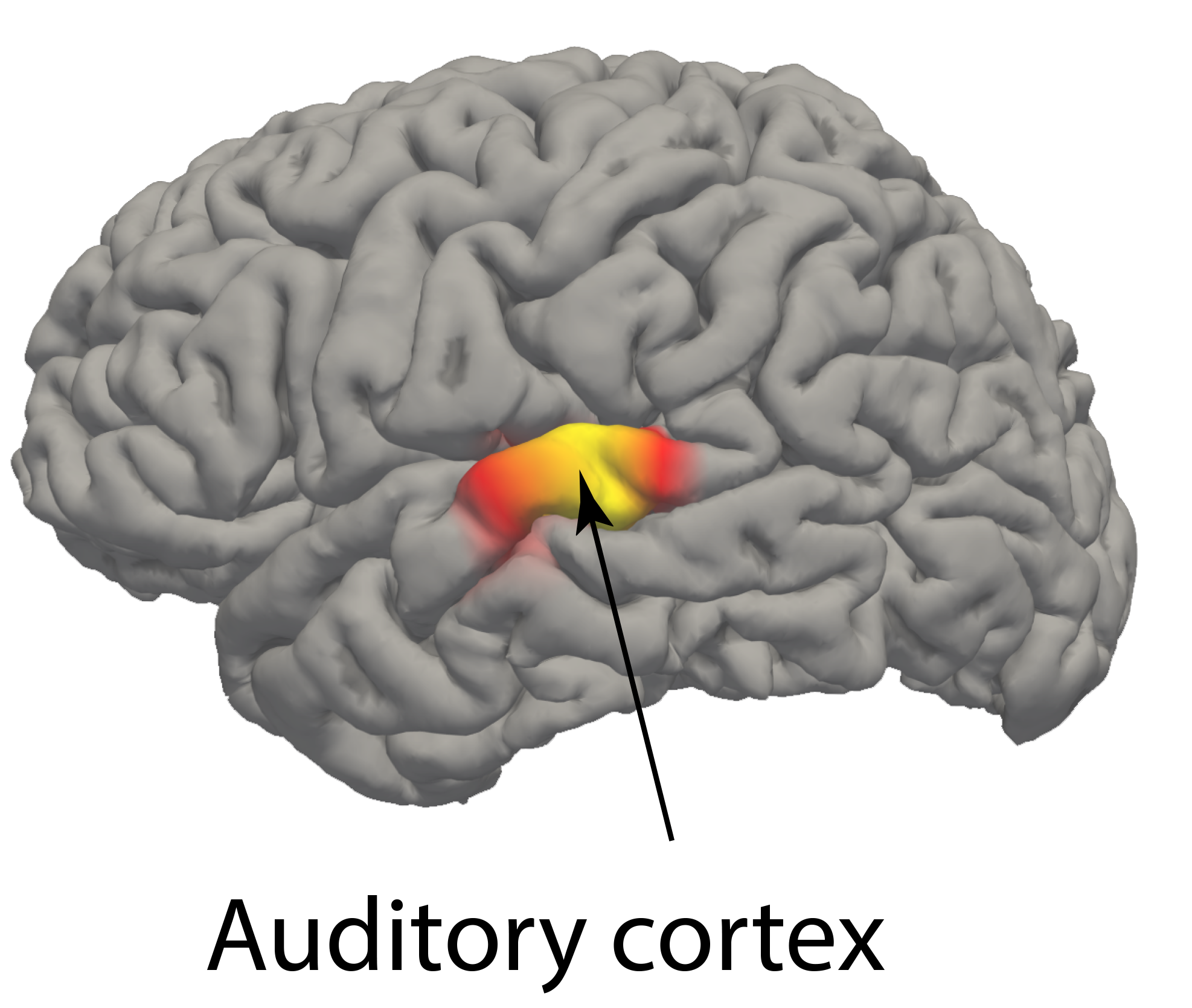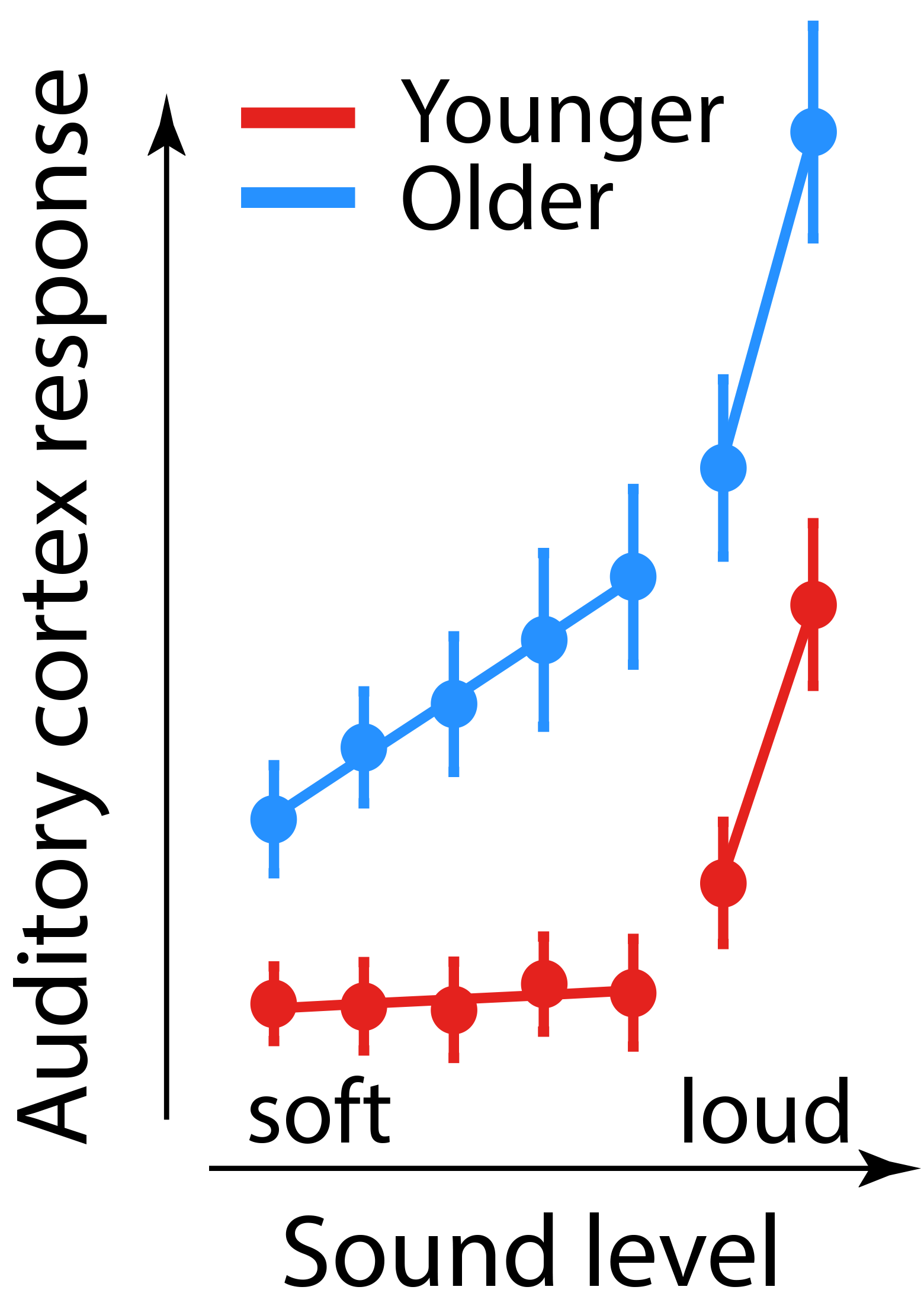
Aging is associated with an over-sensitivity of brain responses to sound
Key Points
Aging and hearing loss leads to increased neural responses to sounds in the auditory cortex compared to younger people. Enhanced neural activity to sound may be a physiological mechanism underlying the difficulty that older adults have with ignoring irrelevant sound information.
Publication
jneurosci.org February 2018
http://www.jneurosci.org/.../1989
BrainsCAN Support
Human Cognition and Sensorimotor Core
Research Support
CIHR, MPG
Western Faculty, Group or Institution
Brain and Mind Institute
Keywords
Aging, hearing & auditory perception, MEG
Related
none

Download this Research Summary as a PDF
Share this page
Background
Hearing loss affects 40% of people aged 50 years or older. Typical problems reported by older individuals include difficulties in understanding speech in the presence of background sound, being easily distracted by sound and perceiving sounds at moderate intensities as being too loud. A common feature of these problems is that older people appear to experience problems ignoring unwanted auditory signals. But what are the underlying changes in the brain that lead to problems in ignoring sound?
For young, normal-hearing individuals, perception of sound depends on a specific listening situation. For example, in a lively bar or at a rock concert, where most sounds are relatively loud, individuals are specifically sensitive to subtle changes in loud sounds, such as hearing a person speak or hearing fine nuances in a guitar riff, respectively. However, sensitivity to loud sounds in these situations requires missing subtle changes in quiet sounds in order to avoid being overwhelmed. Testing whether this ability is impaired in older listeners may help understand why they have problems ignoring sound.
The Research

Figure 1
To a large degree, activity in the brain reflects changes in electric activity; this is how neurons (i.e., the cells of the brain) communicate with each other. Any electric activity also generates a magnetic field, which, if strong enough, can be detected outside of a person’s head using magnetoencephalography (MEG). One brain region that is crucial for sound perception is the auditory cortex in the temporal lobe.
In this work we recruited younger and older adults (aged 18–31 years and 54–71 years, respectively) who listened to pure tones while we recorded their auditory cortex responses (i.e., the magnetic fields) using MEG. For both age groups, we investigated the neural responses to quiet (but audible) tones versus those for louder (but comfortable) tones.
The Findings

Figure 2
Our MEG recordings detected an age-related over-sensitivity to tones. Specifically, neurons in the auditory cortex of older people continued to respond to tones even under conditions in which the same brain region of younger people were non-responsive. Our findings indicate that in loud situations, young, normal-hearing individuals are sensitive to loud sounds at the cost of missing soft sounds, whereas older people are sensitive to soft and loud sounds. This over-sensitivity may be a physiological mechanism underlying the difficulty that older adults have with ignoring irrelevant sound information.
Next Steps
Future research is required to understand the causes for this age-related over-sensitivity and how the physiological changes are related to behavioral outcomes of sound perception. This work will help to obtain a more comprehensive understanding of the physiological changes that underlie the hearing challenges experienced by older people. A better physiological characterization of age-related hearing loss is needed if we are to identify biological markers to diagnose auditory dysfunction in people experiencing hearing difficulties.
We are currently investigating how the reported over-sensitivity to sound in the auditory cortex of older people relates to neurophysiological changes in other brain regions.
Western ResearchersBjörn Herrmann |
Media Coverage |
Figure credits
Figure 1 - Bjorn Herrmann
Figure 2 - Journal of Neuroscience
© 2022 BrainsCAN Western University
This Summary is licensed under a Creative Commons Attribution-Noncommercial-No Derivative Works 4.0 License







